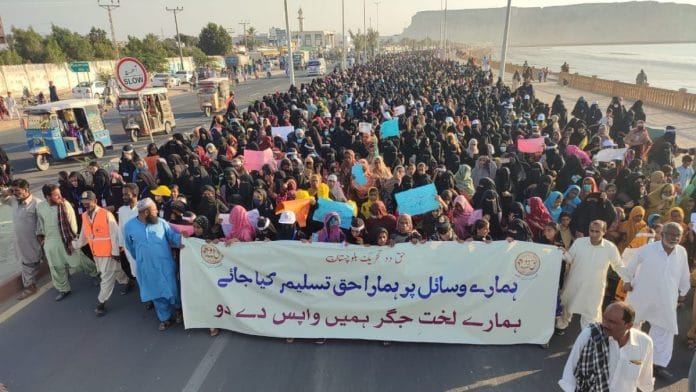New Delhi: The once-strong China-Pakistan relationship is beginning to show signs of strain. The latest bone of contention is comments made by Wang Shengjie, China’s political secretary to Pakistan, accusing Pakistan of engaging in ‘false rhetoric’ about CPEC projects during an interview with The Guardian. Analysts view this growing discord as a counterbalance to the strengthening India-US ties in the region.
The tensions come just days after Pakistan’s Interior Minister Mohsin Naqvi reportedly met members of an anti-Chinese Communist Party (CCP) lobby in Washington. These developments unfolded shortly after Pakistan launched operations at its newly built Chinese-funded airport in Gwadar, Balochistan.
The Chinese embassy in Pakistan quickly moved to downplay Shengjie’s remarks. On Monday, it issued a statement dismissing The Guardian’s report as “completely untrue”.
“The rhetoric and wording imposed is obviously not credible, lacking the basic understanding of China’s position…China has always supported the construction of Gwadar Port and the development of Balochistan. Over the past year, with joint efforts of our two countries, a series of positive progress has been made,” it said.
But political analysts in Pakistan acknowledged there is some truth in Shengjie’s comments.
“There were two key reasons for strained China-Pakistan relations: growing insecurity of Chinese personnel in the country and dues payable to Chinese investors in the power sector,” said Uzair Younus, principal at the Washington DC-based consulting firm Asia Group.
Also read: CPEC made Gwadar look attractive to Pakistan. But ‘development’ ringing hollow to local people
CPEC tensions, freezing China-Pakistan relations
According to The Guardian, Shengjie expressed frustration over the security situation in Pakistan, particularly in Balochistan, where Chinese nationals have faced repeated attacks. In October 2024, two Chinese workers were killed and 17 injured in a suicide bombing blast in Balochistan. The BLA claimed responsibility for the attack.
“If the security is not improved, who would come and work in this environment? There is hatred against the Chinese in Gwadar and Balochistan…Some evil forces are against the CPEC, and they want to sabotage it,” Shengjie reportedly said.
Younus noted that China has been pushing for its own security firms to operate in Pakistan to protect its citizens and assets.
Shengjie also questioned the future of the $62 billion China-Pakistan Economic Corridor (CPEC), of which the newly inaugurated Gwadar airport is a part. He accused Pakistan of creating unrealistic expectations about the project, causing frustration among local residents who anticipated an economic transformation that has yet to materialise.
“We don’t work in rhetoric like Pakistan—we just focus on development. If this kind of security situation persists, it will hamper development,” Shengjie reportedly said.
While the Chinese Embassy claimed Shengjie had been misquoted, many analysts and media outlets in Pakistan argued that the statement was a face-saving measure.
“Chinese diplomats have been openly expressing their displeasure over the Pakistan government’s failure to protect its citizens…. Everyone who interacts with the Chinese these days knows that this rebuttal is merely an attempt at face-saving,” journalist Kiyya Baloch wrote on X.
Also read: Pakistan’s latest worry—A protest against CPEC in Gwadar, a demand for Chinese to leave
Balochistan attacks
The Shehbaz Sharif-led coalition government hailed Gwadar’s $230 million airport as a milestone in bilateral cooperation. However, Chinese officials were noticeably absent at the inauguration event earlier this month, citing security concerns.
Gwadar city itself was placed under a tight security lockdown, local residents had told ThePrint.
While Pakistan Prime Minister Sharif described the airport as a “shining example of Pakistan-China friendship” and a “game-changer”, China’s Global Times called it a “donation”.
However, despite the government’s optimism, CPEC’s future is now uncertain. The region’s security situation, particularly in Balochistan, has led to escalating tensions. Organisations like the Balochistan Liberation Army (BLA) have targeted CPEC projects, resulting in the deaths of Chinese nationals. This has led China to scale back some CPEC projects and withdraw workers.
China taking over the Gwadar deepwater port is another bone of contention.
Abdullah Abbas, executive director of the Human Rights Commission Balochistan, said that large-scale ventures like CPEC often exploit local resources while offering little benefit to residents.
“Previous projects have led to the destruction and militarisation of the area, limiting the movement of local residents and intensifying surveillance across the city,” Abbas told ThePrint.
He also highlighted the adverse impact on the local economy.
“The fishing industry has been particularly hit hard. Fishermen face restrictions accessing the sea, while illegal trawlers deplete marine resources, leaving the ecosystem in ruins,” Abbas added.
A new power equation
The opposition has seized on these tensions, blaming the Shehbaz Sharif government for the deteriorating relationship with China.
PTI leader Mian Aslam Sukhera called Shengjie’s comments a “damning verdict against Pakistan’s incumbent government by China’s Political Secretary to Pakistan”.
“Pakistan is losing regional and global political relevance thanks to this Form-47 installed government,” he wrote on X.
Despite the political blame game, Younus argued that much of the strain stems from a widening gap between expectations and reality in Pakistan-China relations.
While Abbas said that the Balochistan CM had claimed that the Gwadar airport was going to be used for Chinese military operations, Younus dismissed these allegations as “baseless”.
“The real issue with the Gwadar airport is that its development was thought of in isolation to the broader political economy of Gwadar and its adjoining areas,” he said.
(Edited by Prashant)






